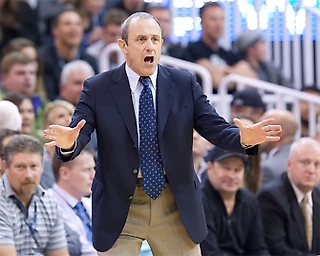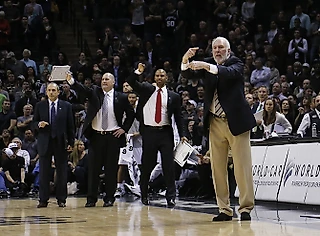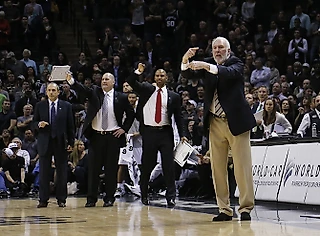What it takes to be a leader
I would like to start this post by pointing out what everybody who watches our games might have noticed lately. JR stepped up and showed incredible leadership not only in terms of points or assists, but in terms of leading the team by example for the last three months. If we evaluate the basketball performance and the leadership qualities, I think JR is playing his best basketball since I’ve known him.
Of course, his self-confidence was greatly supported by the fact that his team won Eurobasket and he proved being a great player in front of the best point guards, like Tony Parker and all the others. So it might be interesting to discuss what it takes to be a leader in the team.
There are two different types of leadership. The first one is silent leadership. It’s when a player leads the others by his example, by his hard-work, by his attitude, by his self-composure in difficult situations. The second one is vocal leadership. There are players that not only lead by example, but also by words. They call them in America “vocal leaders”. They are capable to talk to other players in difficult moments, to help them overcome their fears, to push those who are not doing their best. Being a vocal or a silent type of leader depends mainly on his personality.
In my opinion, the concept of leadership is closely related to the concept of responsibility. Only those who could assume responsibility and fulfill their duties on and off the court are usually considered leaders in a team or in any other organization.
The best player is not always recognized as a leader by the team. There might be different reasons for that. First, he might have much more talent than the others and does not push himself to do his best during everyday training routine. When players see that somebody does not put in 101% of effort every day, he will have only a slight chance to become a leader. Another reason is that sometimes the best player is satisfied with carrying the weight of being the best player and makes his every effort for the team to win. He doesn’t need this extra-burden of carrying responsibility for his teammates like their father or their elder brother. It’s does not mean that he doesn’t want. It’s just too much for him what he’s already doing. He’s more comfortable to be supported by other players, instead of supporting them.
Sometimes the leader is a player of medium talent, who is very hard-working, very responsible and an empathic person able to take care of people around him. Sometimes only one word by him is enough to relax or excite those who need it.
You as a coach can never appoint a leader. This is the most interesting fact. The fact that is widely misunderstood. To have a leader in the team you need your players to recognize somebody as a leader. Ranks or medals don’t necessarily make one a leader. The group defines him based on different criteria. Leadership does not always go together with authority or power. More often it goes with respect to your knowledge and experience and the fact that you care.
A coach can help his players to accelerate the process of determining who is going to take the role of a leader. But it’s never the coach who decides who the leader is. In the teams I coached I had players who were great in both performance and ability to lead by example, but not capable or willing to talk to their colleagues. I had other players that weren’t the best, but they were very good at inspiring their teammates, at underlining the importance of everybody fulfilling their responsibilities in order to win.
Nowadays, it’s more important how you build the team than how you coach the team. If you find good players who have the ability to be leaders, you’ll have much less problems during all season. If among your players there are no leaders, no matter how great they are as players, all of a sudden you might find yourself in a difficult situation with nobody to lead the team.
In my opinion, you as a coach cannot be a leader inside the locker room. You can make the team respect some rules, but you’ll always depend on the fact that the team has one, two or three leaders inside the locker room.
During my three years with CSKA, we’ve had a lot of leaders on and off the court. We went from Panov, to David Vanterpool, to Trajan, to JR and so on. In different moments we needed different kinds of leadership and we’ve always got exactly what was needed.
Everybody can become a leader to some extent, provided he accepts his responsibility, especially when he does this under pressure. When you show that you’re able to do your job well under pressure and you are not afraid of responsibility, there is always somebody to follow your example, even if you don’t say a word.
The ability to co-exist with other people and work for common goals is the essence of leadership. If you think of leadership as a possibility to rise above the others, I think, you’re on the wrong track. I’ve seen several examples of leading the team in the wrong way. Luckily, they were very few. Negative leaders (in sport or in any kind of organization) are also good at influencing people, but they are driven, first and foremost, by their personal goals. They are misleading the others, but they can be as vocal and as assertive as true leaders.
Even a young player might become a leader one day. All he needs is to assume responsibility and fulfill the duties that go with his responsibility. The strongest leader is a person who is really, genuinely happy when his team wins, no matter how well he performed. If you have just a little bit of resentment in your soul, or you’re not completely happy for the others, it will be more difficult for you to lead the team. Being a true leader is taking responsibility for the team as a whole.
Of course, it’s more difficult for a young player to become a leader. If you’re young, you must show your great abilities under pressure and play at a very high level in crucial moments to be considered leader. It’s very rare for youngsters to take vocal leadership in the team. But there are exceptions, as leadership is an innate quality to some extent. The history is full of examples. Joan of Arc leaded the French Army when she was eighteen. Jesus led people since his twenties.
In any team there is either a share of leadership inside the team or the leadership is in the hands of one person. I don’t think it is good for the team to have only one leader. In CSKA we have many people who can lead us through various circumstances. This is something special about our team. When we need a leader, we’ve got one or even several, especially in the end of the seasons. Most of our players either are leaders or have all the potential to become ones.
Early in the seasons our team is trying to find an inside balance with the help of different kinds of leadership from different players. The risk to lose is higher during this period. The balance is not only about distribution of minutes, shots, rebounds, it’s about deciding who will step up when it’s required by the circumstances, it’s about credibility.
Injuries of key players make the team find new balance. For example, Matjaz is one of our leaders. After his injury, other players needed to redistribute the leading roles. It took a little while, but now it’s set. When Matjaz will come back, we’ll need to rebalance it again.
It’s a perfect example of dynamic balance that constantly evolves. For me, it’s the most interesting part of our work, not only in sports, but, generally speaking, in all sorts of organizations. What we have now in terms of balance might be different in two or three months. Some players got injured, some — improved their performance a lot and deserved more credibility, some — showed different abilities. As a result, you have a totally different situation. It’s not worse or better, it’s just different. Every situation, every experience makes people different and relationships between them change very frequently. You can no longer rely on what you had in the past, you need to reshape what you have to fit in the future.
In sports (and this is why people who study organizational behavior like to focus on sports), where we have big number of games to play and a high level of pressure to stand, all these factors are accelerated. It’s like in a chemical reaction, where expectations of great many people make it run faster. The same things happen in banks, offices and any other organizations. People leave, they come back, they step up, they step down. They experience success, failure, stress and at the end they are not the same. Month after month, they change. And every time we need to look for a new balance.
However all this pressure, all those expectations make a huge difference. In normal office life, if you screw up, almost nobody will notice. It’s behind the closed doors of your office. Here you are in the eyes of everybody. All the processes are strongly influenced by the fact that we are judged by the public. It might cause a big ego problem, a great discomfort because of other people’s opinion. Sometimes you are forced to change your behavior just to protect your position. Being in the spotlight is an incredible pressure. You have to perform at the best level every time. Thus you must have a leader every single game.





Other than that - a fantastic article, insightful and to the point, as always.
Thank you, Ettore!
Leaded means covered (or poisoned) by lead. :)
--------------------------------
That′s good, but little bit simple view.
What can you do if you have a situation with false leader?
Sometime it happens.
I mean Kobe Bryant in LA, or Wilt Chamberlain.
They were (are) brilliant players. But...
What can you say?
Or, thanks God, you don′t have such great leaders in CSKA. :)
Can you make Michael Jordan (real team leader and geat player) from Kobe?
Kobe wants to play his stong, but not his team weak points.
What is the clue to resolve this kind of puzzle?
I think JR or Kirilenko are very ideal leaders.
Kirilenko could do 0 points and win the game if the team need it.